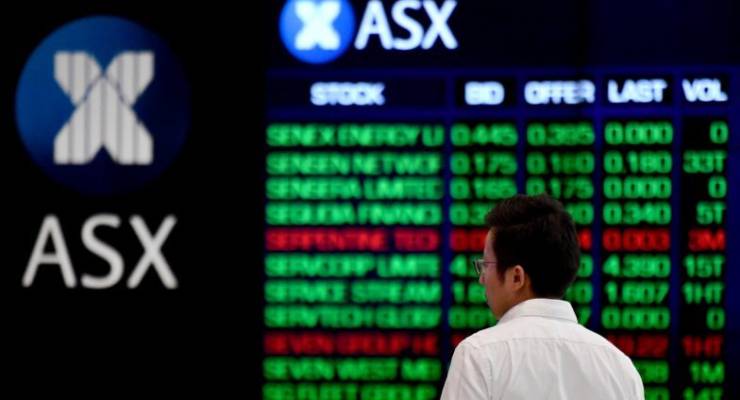
Call it the great Ken Hayne market rally of February 5, 2019 — the ASX was up 1.4% or 85 points in 30 minutes in one of its strongest openings for months. The surge was led by the big four banks and some wealth managers who investors reckon have escaped any real penalties from the royal commission, despite all the headlines and obvious examples of breaches of law and poor practice.
In early trading, Commonwealth Bank shares rose 4% (it reports its December half results tomorrow and the hand wringing and mea culpas will be heard all across Australia), and ANZ’s 5%. Westpac rose nearly 6%, AMP surged 8% and IOOF 10%. Both IOOF and AMP are considered to be the two companies most likely to face serious legal trouble down the track, but investors rejoiced there were no immediate threats from yesterday’s final report despite the litany of misconduct identified.
NAB’s shares rose less — around 3.5% — reflecting that the bank’s CEO Andrew Thorburn and chair Ken Henry were singled out for criticism by Hayne over their lack of interest in addressing the bank’s fee-for-no-service scandal. In a statement issued by the NAB board early Tuesday morning, both men rejected the Hayne’s claim that he is “not persuaded that NAB is willing to accept the necessary responsibility for deciding, for itself, what is the right thing to do, and then having its staff act accordingly …”.
“[That] does not reflect who I am or how I am leading, nor the change that is occurring inside our bank,” Thorburn insisted. “While we have made mistakes, I believe there is a lot of evidence that we are making sustainable and serious change to once again regain the trust of all our customers.”
Henry responded to the suggestion that he refused to accept criticism by refusing to accept that criticism:
In his final report, Commissioner Hayne said I seemed unwilling to accept criticism … I am disappointed that the Commissioner formed this view. I know that it is not so. The Board and I have reflected deeply on those and other issues and, as I have said previously, we take them very seriously. We have said we are not prepared to accept good intentions where urgency, consistency and discipline is required.
NAB’s shareholders delivered the biggest ever “no” vote on the bank’s remuneration at the annual meeting last last year. The 88% no vote was a record. Even at this early stage it is clear the bank will face significant opposition at this year’s AGM and the Commissioner’s comments about Henry and Thorburn and their continuing presence in the bank’s boardroom will allow shareholders to maintain the rage.
But from investors’ point of view, it seems they believe the worst is over and the major financial institutions will be able to return to the business of making money, albeit in a slightly more restricted regulatory environment.









Was there anyone in Australia who witnessed Henry’s surly and, it must be said, utterly puerile responses at the Royal Commission who was not staggered by his arrogance and pomposity. For a guy who, until that point, seems to have had an outstanding career and reputation as a public servant, he belittled himself; showed a side of his character that I am sure he would have preferred was only seen behind closed doors and generally stained his reputation, probably terminally – all for “thirty pieces of silver”. Is that what NAB hired him for? I would argue his “performance” did as much to damage the reputation of his employer as any of the NAB’s other acts as it highlighted a banking sector that cares about itself and its pretence that customers are important is simply hollow weasel words. Of course, the systematic destruction of the branch network right across the banking sector, including leaving many a country town without a bank (only recently, BankSA closed its branch in a town south of Adelaide and in a f*** you to local customers who need to go to a branch left them to drive 20 minutes to Victor Harbor), shows what the banking sector really thinks about customers – we come way down the list.
I wasn’t surprised at all by Henry’s attitude which was the same as I’d always perceived it.
Many of we bank shareholders are breathing a sigh of relief more because the RC indicated managements hadn’t blown up the business. Problems, rorts, probably crimes, yes, which I still hope will be fully pursued. Banking is still an inherently risky highly geared business which can go bad quickly, especially when dodgy operators are off the leash. You can’t run any sustainable business endlessly ripping off a significant portion of customers. The RC has made that clear and smart investors have answered.
Investors know that leopards cannot change their spots. Changeing the culture of an organisation requires brutal honestly and absolute protection of whistleblowers. Consider the harrowing failure to reform police culture.
I’ve just got this feeling that the bankers are just breathing a sigh of relief and thinking this will be just a bad dream very soon. Apart from the few who will hopefully be facing charges.
The LNP will do what they can to see this blow over, much sound and fury and strutting and fretting and then heard no more.
Can Labor win government and actually make a difference? Maybe. Not full of confidence.
It suggests that the BigAr$ed end of town have faith that their donations, rather paltry in the scheme of things, to both T1 & T2 will ensure that nothing substantial will alter their capacity for rapacity. Both parties are complicit and gutless before the bosses.
Plus ca bloody change.